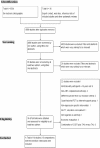Is computerised CBT really helpful for adult depression?-A meta-analytic re-evaluation of CCBT for adult depression in terms of clinical implementation and methodological validity
- PMID: 23587347
- PMCID: PMC3638010
- DOI: 10.1186/1471-244X-13-113
Is computerised CBT really helpful for adult depression?-A meta-analytic re-evaluation of CCBT for adult depression in terms of clinical implementation and methodological validity
Abstract
Background: Depression is a major cause of disability worldwide, and computerised cognitive behavioural therapy (CCBT) is expected to be a more augmentative and efficient treatment. According to previous meta-analyses of CCBT, there is a need for a meta-analytic revaluation of the short-term effectiveness of this therapy and for an evaluation of its long-term effects, functional improvement and dropout.
Methods: Five databases were used (MEDLINE, PsycINFO, EMBASE, CENTRAL and CiNii). We included all RCTs with proper concealment and blinding of outcome assessment for the clinical effectiveness of CCBT in adults (aged 18 and over) with depression. Using Cohen's method, the standard mean difference (SMD) for the overall pooled effects across the included studies was estimated with a random effect model. The main outcome measure and the relative risk of dropout were included in the meta-analysis.
Results: Fourteen trials met the inclusion criteria, and sixteen comparisons from these were used for the largest meta-analysis ever. All research used appropriate random sequence generation and Intention-to-Treat analyses (ITT), and employed self-reported measures as the primary outcome. For the sixteen comparisons (2807 participants) comparing CCBT and control conditions, the pooled SMD was -0.48 [95% IC -0.63 to -0.33], suggesting similar effect to the past reviews. Also, there was no significant clinical effect at long follow-up and no improvement of function found. Furthermore, a significantly higher drop-out rate was found for CCBT than for controls. When including studies without BDI as a rating scale and with only modern imputation as sensitivity analysis, the pooled SMD remained significant despite the reduction from a moderate to a small effect. Significant publication bias was found in a funnel plot and on two tests (Begg's p = 0.09; Egger's p = 0.01). Using a trim and fill analysis, the SMD was -0.32 [95% CI -0.49 to -0.16].
Conclusion: Despite a short-term reduction in depression at post-treatment, the effect at long follow-up and the function improvement were not significant, with significantly high drop-out. Considering the risk of bias, our meta-analysis implied that the clinical usefulness of current CCBT for adult depression may need to be re-considered downwards in terms of practical implementation and methodological validity.
Figures







Comment in
-
Review: computerised CBT improves adult depression in the short-term, but its effect may have been overestimated previously.Evid Based Ment Health. 2013 Nov;16(4):119. doi: 10.1136/eb-2013-101404. Epub 2013 Aug 12. Evid Based Ment Health. 2013. PMID: 23939679 No abstract available.
-
Computerised cognitive behaviour therapy for major depression: a reply to the REEACT trial.Evid Based Ment Health. 2016 May;19(2):43-5. doi: 10.1136/eb-2015-102293. Epub 2016 Mar 18. Evid Based Ment Health. 2016. PMID: 26993366 Free PMC article.
References
-
- Beck AT. Cognitive therapy and the emotional disorders. Oxford, England: International Universities Press; 1976. p. 356.
-
- Department of Health. Treatment choice in psychological therapies and counselling. Evidence-based clinical practice guideline. In. London: DOH; 2001.
Publication types
MeSH terms
LinkOut - more resources
Full Text Sources
Other Literature Sources
Medical
Miscellaneous

